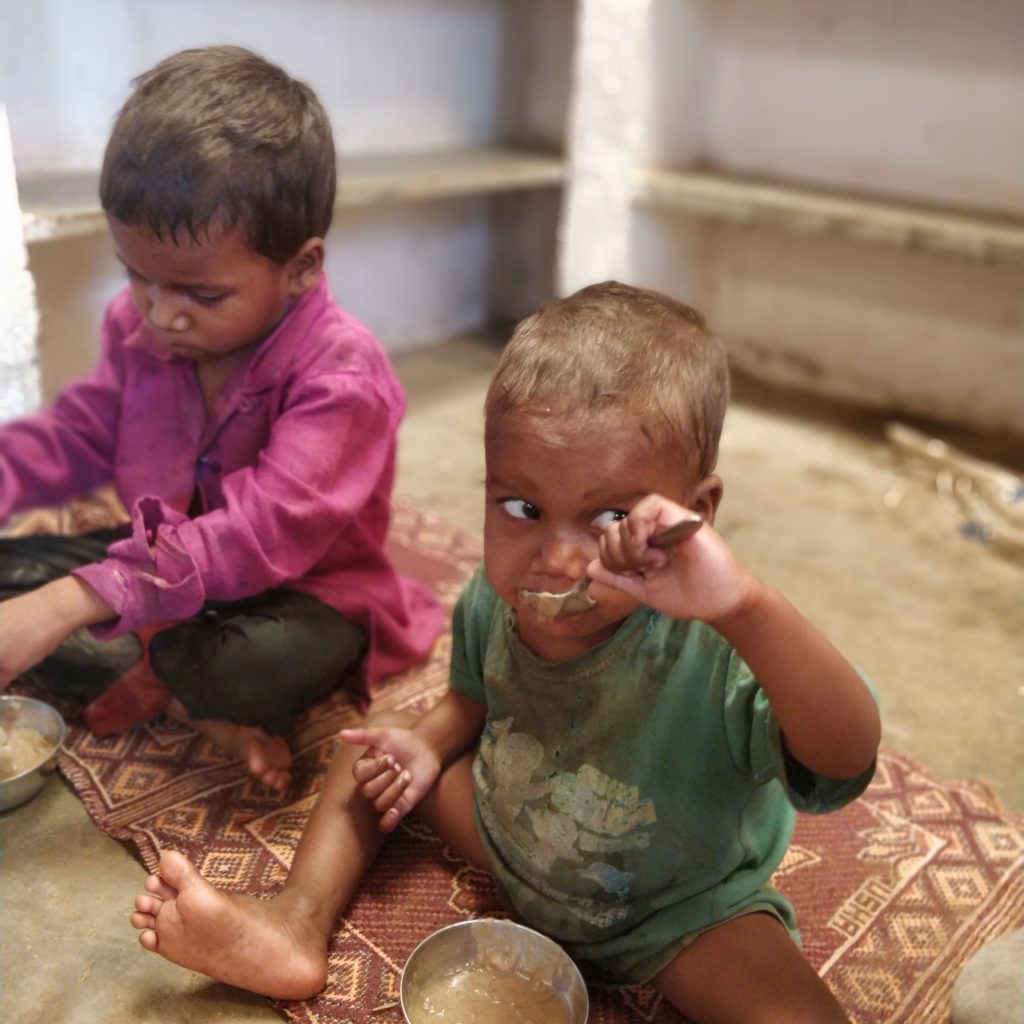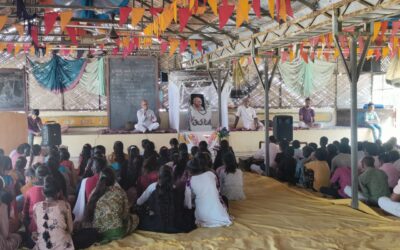Pushpa, one of the health workers counselling Anjana on five food groups with the help of a flip book
Phulwari Workers
Phulwaris are creches located deep within the rural regions of South Rajasthan. Each Phulwari serves about 20-15 children below the age of 5. The children are taken care of, fed, and educated by local women from the same village, also called the Phulwari Workers. Narrowing it down to one Phulwari in Morwal, Gogunda, we have Ratni Bai. Here’s two stories that she shared with me and I now, share them with you.
“Khushi* is around 4 years old. A while after she was born, her mother died by suicide for reasons unknown. She is now under the care of her grandparents. 2 years ago when Khushi first came to our Phulwari, she was so weak, she could barely stand. Now, she eats well and has gained considerable weight. She responds to us and even smiles more often. I am certain that a child’s future is secure because of the Phulwari. We are taught new topics every month. If there were Phulwaris when I was a child, I would’ve been more educated, independent, and healthy, I wish there were.”

Anand* has been a regular child at the Phulwari. He is accompanied by his older brother (in the picture) who looks after him. They are under the guardianship of their grandparents as their mother passed away a while back. In the beginning, Anand cried at the sight of anyone who was new. It was a task to calm him down. Fast forward to a few months, looking at his brother eating by himself, Umesh refuses to be fed by anyone. Regardless of the struggle, he faces to dip his spoon in the Sattu and place a morsel into his mouth, he feeds himself. Umesh also walks to the bucket of water by himself after one simple instruction to get his hands and mouth washed before & after having food.
Basic Healthcare Services runs 14 such Phulwaris employing and training 28 Phulwari workers every month and providing care to 200+ children.
Swasthya Kirans
Villages in south Rajasthan have scattered habitations on hilly terrains which makes them poorly accessible. People are deprived of their basic right to health, hygiene, and education. Swasthya Kirans (SK) are local women appointed from each hamlet. They are trained and supported by BHS. They receive training every month on various health topics. They link patients to AMRIT clinics and initiate conversations with the people in their village around health and nutrition-related topics.
Savagi Bai has been a SK for 5 years and has introduced 300+ critical patients for treatment at Amrit clinic. Few months ago, I was informed that a relative of mine passed away due to Tuberculosis. He had exhausted all his savings to receive treatment from quacks and other unreliable services. When I got to know that his wife is also battling TB and is on the verge of selling her land, I journeyed to their home and convinced them to come to Amrit clinic. She is now on her road to recovery. Many of us come from difficult financial backgrounds and no educational qualifications. None of this matters at Amrit clinics. I just want to see everyone in my village healthy and happy.

This is Pooja* bai. She has a son, and two daughters, Yamini (5 years) and Piya (1 year). Her husband, her daughter Yamini*, and herself were diagnosed with Tuberculosis. They went to almost every reputed hospital in Udaipur and Gogunda, but to no avail. With just one drop of hope, she met Savagi Bai. The three of them started their treatment together at Amrit clinic, Morwal and with great happiness she says “We have all defeated TB and are in perfect health. My family would’ve died if Amrit Clinics weren’t there. Since then, along with us, this entire village trusts Amrit Clinics.” Her daughter Piya, was delivered at the clinic too! She then proceeded to tell us how she hopes for a good future with a peaceful heart.
Basic Healthcare Services leads a team of 93 Swasthya Kirans
Health Workers
The anchor at Amrit clinics. They hold meetings, and campaigns and execute intensive outreach programs within the hamlets around the clinics. They counsel people in the local language and follow up with those who are extremely ill. Here’s sharing a write-up by one of our health workers, Pushpa.
“During one of our postnatal care visits in the field, we noticed that 12-year-old – Anjana* looked extremely ill. She struggled to walk straight and took long sharp breaths. This alerted us. On further investigation, we were informed that she has been sick for the past 3 years. The family took her to a traditional healer. This failed to change Anjana’s fate. We managed to convince her elders to visit the clinic and that’s how we learned that Anjana’s hemoglobin was significantly low. We then proceeded to counsel the family on her food and medicine requirements. The clinic provided the requisite treatment and we explained to the family how by eating well and taking her medications on time, Anjana would start to heal. Within a few months, Anjana got better, her hemoglobin is now normal and she is able to breathe at ease. Her family keeps expressing their gratitude to us. Counselling all our patients on the importance of eating healthy during their treatment and recovery is very crucial. We elaborate on how eating healthy every day will prevent further illnesses in the future as well. This is my role, to counsel patients and their families and keep following up with them until they are healthy again.”
12 heath workers lead the Swasthya Kirans and Phulwari workers



0 Comments